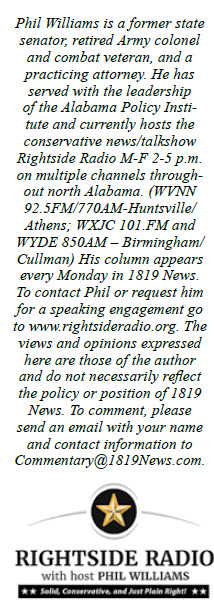 By: Phil Williams
By: Phil Williams
Keep your eyes on Texas. What we are seeing play out in the fight to defend our southern border is a constitutional crisis of the highest order. It is also the recipe by which our founders sought to protect against tyranny and invasion.
The Founding Fathers knew their business. They were operating on an inspired level when they drafted the US Constitution and its first ten amendments, commonly referred to as the Bill of Rights. Not without some fuss mind you. Debate over the final drafts was heated at times, but in the end certain inalienable rights were adopted, duly passed, ratified by the Colonies, and enshrined as examples of what can and should be for people to live free.
I should stress here that we are talking about “rights” — not permissions, not opportunities, not allowances, but rights! Rights are imperatives. They are deemed absolute in nature. Rights are defensible, and they are designed as barriers to tyranny.
Discussion centers most often on the First, Second, and Fourth Amendments. Freedoms of speech, religion, assembly, bearing arms, and to be free from unreasonable search and seizure.
But this past week, the governor of Texas gave us a heaping helping of the Tenth Amendment, the sovereign right of an individual state to preserve the interests of its own citizenry. Governor Greg Abbott has taken a constitutional stand unlike what we’ve seen in living memory by telling the federal government that if it will not defend the Texas border, he will do so himself under the authority given to him by the Constitution of the United States. The Tenth Amendment to the US Constitution states: The powers not delegated to the United States by the Constitution, nor prohibited by it to the states, are reserved to the states respectively, or to the people. But why would the founders spend so much blood and treasure seceding from a monarchial form of government only to pass an amendment designed to give away part of their new powers of governance? It’s a worthy question.
It comes down to the fact that we are a republic, founded upon the concept of federalism. A nation in which the people have their say through elected representation and yet designed not to be one central form of government which holds all power and authority. Power is decentralized and shared with the states. The Tenth Amendment is one of our walls against tyranny. In the case of Texas, it is a defense against the tyranny of inactivity that has resulted in invasion.
 Relying upon his sovereign right under the Tenth Amendment, Governor Abbott has demanded that the federal government first exercise its own duty under Article IV of the Constitution to defend the borders. But in the absence of meaningful action by the Biden administration, Abbott had no choice but to look to see what options “were not prohibited by it to the states.” In doing so he found Article I, Section 10, Clause 3 of the Constitution that specifically empowers states to take action when “actually invaded, or in such imminent danger as will not admit of delay.” Governor Abbott officially declared a state of emergency on the basis of an invasion on the Texas border. Ensuing now is the largest and most consequential constitutional crisis our nation has faced in living memory.
Relying upon his sovereign right under the Tenth Amendment, Governor Abbott has demanded that the federal government first exercise its own duty under Article IV of the Constitution to defend the borders. But in the absence of meaningful action by the Biden administration, Abbott had no choice but to look to see what options “were not prohibited by it to the states.” In doing so he found Article I, Section 10, Clause 3 of the Constitution that specifically empowers states to take action when “actually invaded, or in such imminent danger as will not admit of delay.” Governor Abbott officially declared a state of emergency on the basis of an invasion on the Texas border. Ensuing now is the largest and most consequential constitutional crisis our nation has faced in living memory.
When the American colonies declared their independence from the British crown, they declared their desire to live freely. Prior to the American Revolution, the colonies had lived at the discretion of the king. When all power and decision-
making authority is vested in one place, one branch, or one office, the temptation to do all that comes to that person’s mind can prove to be alarmingly overwhelming and create horrific consequences.
A centralized government, with no fetters or restraints, is the base ingredient for tyranny which the Founding Fathers well knew when they built the framework for the United States. The creation of checks and balances were designed so that ultimate power would not wind up vesting itself so deeply in one single form of governance. But they also saw a need to make sure that a federal government sitting from afar in our nation’s capital could not act, or omit to act, in a way that harmed the outlying states. We cannot have an unrestrained federal government that focuses all of its power in one direction to the detriment of all else and all others.
Every state has its own governance and its own sovereign right to make determinations as to what constitutes the necessary protections, health, wellbeing, and legal standards by which their respective state shall abide. States also have a sovereign duty to protect and defend the interests of their citizens against encroachments.
When you hear that one state’s legislature is passing laws that differ from other states, or a state attorney general is taking legal action against the federal government, or that the Governor of Texas is pushing back on federal inability to defend his border, that stance is predicated upon the fact that the Tenth Amendment gives those state officials the actual right to do so.
The Founding Fathers knew what they were doing. They had lived through the results of an unchecked imbalance of power and they knew that devolving power outside of central government was key. A republic, coupled with federalism, mixed
with the Tenth Amendment, and clothed in constitutional authority – that is the recipe for building a wall against tyranny and invasion.
By: Phil Williams








 June 20, 2025
June 20, 2025



